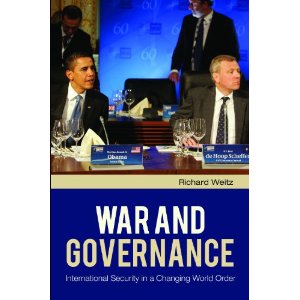01/03/2012 By Robbin Laird
Many years ago when finishing my graduate degree in Political Science at Columbia University I wrote my dissertation on how to understand the nature and dynamics of historical change. The title of the dissertation was order within chaos, and the core point was that stability was harder to explain than change.
 With the end of the Cold War, and the end of the unipower moment while new Asian powers were ascending, there is a new decade and period ahead of us whereby creating global stability will be harder than simply coping with chaos. One element of crafting stability in the period ahead is an ability to leverage, use, and shape international organizations, which meet at the gap where legitimacy meets chaos. Nation states in various international organizations or clubs grasp for tools to shape stability in regions without states, without governments or are the domain of the tribes that populate the globalized marketspace.
With the end of the Cold War, and the end of the unipower moment while new Asian powers were ascending, there is a new decade and period ahead of us whereby creating global stability will be harder than simply coping with chaos. One element of crafting stability in the period ahead is an ability to leverage, use, and shape international organizations, which meet at the gap where legitimacy meets chaos. Nation states in various international organizations or clubs grasp for tools to shape stability in regions without states, without governments or are the domain of the tribes that populate the globalized marketspace.
In a sense, if various international organizations like NATO, the EU, the UN, the Group of 8, the African Union did not exist they would have to be invented. These organizations have evolved over the past 20 years to fill gaps, to be used by key nation states and regional players to put organizational solutions in place where disorder has dominated order.
In an important book, Richard Weitz has provided an overview and analysis of the evolution of several of these institutions and provided a balance sheet of the performance of those organizations. It is book written by realist who does not make the case that these security organizations have kept the peace, but rather are being used to try to shape in the presence of chaos. The tools are inadequate; nation states are the key players and the outcomes frequently incomplete and ambiguous. But these organizations exist to provide legitimacy for actions that would otherwise not happen, and if they did not happen chaos would be even more prevalent, and the cascading consequences significant.
Weitz makes it clear that the competition between legitimacy and effectiveness is a core challenge facing nations when drawing upon international security organizations. “Seeking a global or regional consensus can require degrading effective action to the lowest acceptable common denominator. The more universal and formal the security institution, the greater the chance that opposing interests will be encountered and more constraints placed on actions due to formal rules established through charters and organizational norms. (Page 165).
Weitz looks at the performance of several international organizations in providing for global security, namely the UN, the Group of 8, and the African Union. He then proceeds by shaping two case studies to look at the good, the bad and the ugly of the performance of international organizations in meeting a security gap, namely, Kosovo and Somali piracy.
It will be interesting to see how the fiscal crises hitting the US and Europe will effect the role of such international organizations, because the West has provided the core financial, organizational and force structure support to many international organizations. Will chaos increase as means are reduced, perhaps significantly by the economic downturn? Or will other states fill the gap and re-shape these institutions? Will India, China, and Russia be more multi-lateral than the West that preceded them, or will a new style of 21st century nationalism come to the fore?
Has Weitz provided an epilogue on an era or the prologue to a new one? Only time will tell, but Second Line of Defense highly recommends to our readers that you make time for Weitz’s new book.
Richard Weitz, War and Governance: International Security in a Changing World Order (Santa Barbara, California: Praeger, 2011)
The book is part of a series edited by James Jay Carafano entitled The Changing Face of War.


